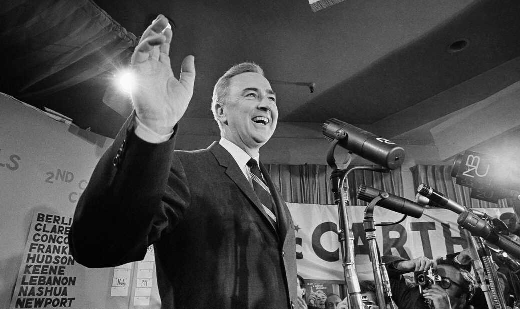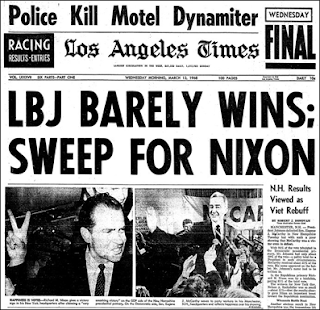Tales of the unexpected

 For the television historian, one of the great pleasures in reading back issuse of TV Guide is coming across the unexpected. And in this case, I'm not referring to something that I didn't expect; no, I'm talking about something that the author of the story didn't expect, something that he had no reason to expect would happen; when you combine that with the need to write for a deadline—well, see for yourself.
For the television historian, one of the great pleasures in reading back issuse of TV Guide is coming across the unexpected. And in this case, I'm not referring to something that I didn't expect; no, I'm talking about something that the author of the story didn't expect, something that he had no reason to expect would happen; when you combine that with the need to write for a deadline—well, see for yourself. In reviewing some old issues the other day, I came across the issue of March 16, 1968. Now, I reviewed this issue before , but somehow or other I missed this little gem that led off the Doan Report, written as always by Richard K. Doan. Headed "Networks Yawn Over Primaries," the lede tells you all you need to know: "The primaries are going to get the most fleeting attention from TV in the medium's history unless they develop more heat than New Hampshire did." The operative word is did, because the New Hampshire primary was held on Tuesday, March 12—two or three days before this issue of TV Guide would have hit the newsstands. The focus of the primaries has been on the Republican side, and with the sudden and—here's that word again, unexpected—withdrawal of Michigan Governor George Romney, the GOP race has been left wide open for former vice president Richard Nixon. "The networks, convinced this left little doubt about the outcome in N.H., immediately canceled plans for prime-time primary-night specials in favor of bulletins and brief late-evening vote summaries." And, in fact, Nixon did win decisively, racking up 77.6% of the vote, compared to (then) non-candidate Nelson Rockefeller, with 10.8%. In fact, Doan says that TV time for the remaining primaries "depends on how strongly, if at all, Governor Rockefeller comes on against Nixon."
 Now, there were, of course, two presidential primaries held in New Hampshire on March 12; one for the Republicans, and one for the Democrats, where President Lyndon Johnson was, like Nixon, expectec to win easily. And it's true that nobody paid much attention to Nixon's win—because of the shocking Democratic result, where maverick anti-war challenger Eugene McCarthy won 42% of the vote, compared to Johnson's 49%. Politics being one of those few areas in which a loss can be spun as a win, the media immediately proclaimed this a disastrous outcome for Johnson, as indeed it was. He may have won the primary, but to have done so poorly against a relatively unheralded candidate was nothing short of a catastrophe. Four days later, on March 16—the date of this issue—Robert F. Kennedy announced his candidacy for the nomination. With two such challengers, Johnson was now anything but a sure winner; polling in Wisconsin, site of the next primary on April 2, showed McCarthy beating Johnson badly. A little over two weeks later, on March 31, LBJ shocked everyone by announcing that he would not be a candidate for reelection. (He had, in fact, never formally announced his candidacy; it was something that people simply assumed.)* You'd better believe the networks were plenty interested in the Democratic primary by now.
Now, there were, of course, two presidential primaries held in New Hampshire on March 12; one for the Republicans, and one for the Democrats, where President Lyndon Johnson was, like Nixon, expectec to win easily. And it's true that nobody paid much attention to Nixon's win—because of the shocking Democratic result, where maverick anti-war challenger Eugene McCarthy won 42% of the vote, compared to Johnson's 49%. Politics being one of those few areas in which a loss can be spun as a win, the media immediately proclaimed this a disastrous outcome for Johnson, as indeed it was. He may have won the primary, but to have done so poorly against a relatively unheralded candidate was nothing short of a catastrophe. Four days later, on March 16—the date of this issue—Robert F. Kennedy announced his candidacy for the nomination. With two such challengers, Johnson was now anything but a sure winner; polling in Wisconsin, site of the next primary on April 2, showed McCarthy beating Johnson badly. A little over two weeks later, on March 31, LBJ shocked everyone by announcing that he would not be a candidate for reelection. (He had, in fact, never formally announced his candidacy; it was something that people simply assumed.)* You'd better believe the networks were plenty interested in the Democratic primary by now. *Later in the week, Martin Luther King, Jr. is assassinated. Talk about unexpected.
Now, none of this is a reflection on Richard Doan; as was the case throughout much of the 1968 campaign, nobody could possibly have forseen what was to happen—or, thanks to the vagueries of publishing deadlines, what had already happened. What this shows is how capricious history can be when she wants, and that year she wanted very much indeed. And that's one of the reasons why we study history, history of any kind; as Mark Twain once said, "History never repeats itself, but it does often rhyme."
As for the remainder of the primary season, Nelson Rockefeller, after months of denials, announced on April 30 that he would, indeed, be a candidate. Ronald Reagan later announced his own candidacy, and a host of favorite-son candidates tried (unsuccessfully) to hold the balance of power in the delegate count. The GOP race doesn't quite have the drama of the Democratic battle; Vice President Hubert Humphrey throws his hat in the ring on April 27, and becomes the establishment candidate, counting on the support of unions and party regulars. He's too late to get into the primaries, but remember, there are only a dozen or so of them back in 1968; the rest of the delegates would be chosen either by caucus or at the party's state convention. And so the experts expected the battle would continue well past the final primary—June 4 in California, where the unexpected continues. TV
Published on March 08, 2023 05:00
No comments have been added yet.
It's About TV!
Insightful commentary on how classic TV shows mirrored and influenced American society, tracing the impact of iconic series on national identity, cultural change, and the challenges we face today.
- Mitchell Hadley's profile
- 5 followers



